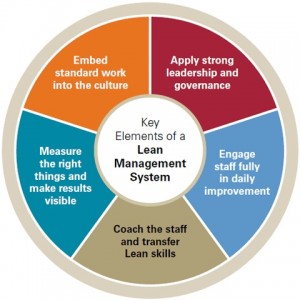 Lean management began as an effort at Toyota to reduce time for a manufacturing process and thus reduce in-process inventory. This became known as just-in-time inventory management. The result was less warehouse space, fewer forklifts, less workshop space, etc. Once the flow of work can be free of interruption and unnecessary repeat work, waste is eliminated. Lean is therefore the elimination of waste. But, more importantly, lean is continuous improvement in all work processes…
Lean management began as an effort at Toyota to reduce time for a manufacturing process and thus reduce in-process inventory. This became known as just-in-time inventory management. The result was less warehouse space, fewer forklifts, less workshop space, etc. Once the flow of work can be free of interruption and unnecessary repeat work, waste is eliminated. Lean is therefore the elimination of waste. But, more importantly, lean is continuous improvement in all work processes…
In order to improve the work of the manufacturing process, Toyota management did not legislate what needed to be done. Instead, the workers were challenged to think, to innovate and to find ways to speed up the process by eliminating unnecessary activities. The workers acted as a team to seek improvement. It was the workers themselves who understood the work better than anyone else and who could observe best what was going well and what was not working.
This concept of improving the process by those who do the work, and who are on-the-spot is the essence of lean management. Management does not presume to know – instead it encourages and allows experimentation.
This model was emulated by Honda and other Japanese companies and has now become the standard of quality manufacturing. It has also now become relevant for management in many different kinds of non-manufacturing organizations. In fact, any organization that believes it has processes that need streamlining can leverage the principles of lean management.
Lean is essentially a process of learning and improvement. It cannot be defined as one tool or something fixed. It is not about copying what Toyota did and it is not a one-time project implemented by an outside consultant. It is rather a philosophy of practice rather than a new method or toolkit.
Here are some ways of understanding lean philosophy:
Lean is a culture of continuous improvement practiced at every level of the organization and by every team.
Lean is respect for people and for the voice of the customer.
Lean is the elimination of waste in all its forms. It is the ability to distinguish between work that actually adds value to your customers and work that does not.
Lean is a focus on improving the work process and not on blaming people or creating fear.
Lean is a culture of teamwork, shared responsibility and ownership that cuts through functional silos.
Lean is flow – an interruption free process that flows from beginning to end smoothly.

Leave a Reply